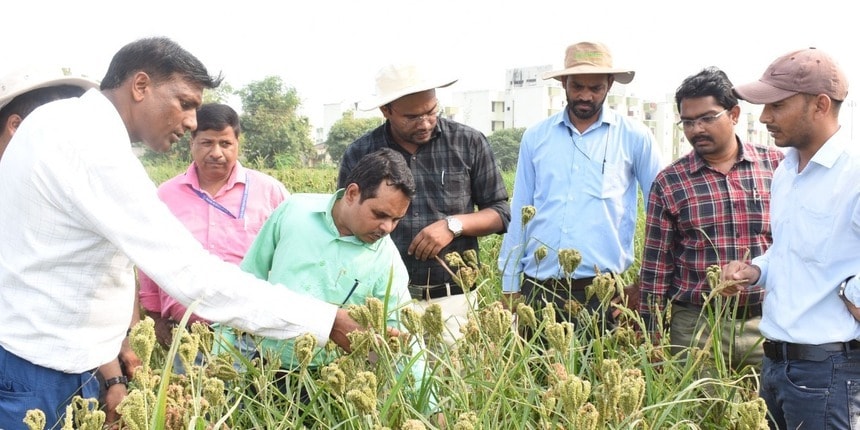ICAR introduces two new UG courses in natural farming and agriculture business management
Sanjay | October 23, 2024 | 11:33 AM IST | 4 mins read
BSc Ag (Hons) Natural Farming will consist of 176 credits, Agribusiness Management will have 171; students need to complete 10 credits through online courses

NEW DELHI: The Indian Council for Agricultural Research (ICAR) has introduced new undergraduate programmes in two disciplines, Natural Farming and Agribusiness Management or ABM.
The programmes are part of the proposals in the ICAR’s Sixth Deans’ Committee Report. They aim to inculcate skills of sustainable and entrepreneurial agricultural practices among students.
These two programmes are among the 13 UG disciplines in agriculture and allied sciences recognised by the ICAR.
The new UG agriculture course on natural farming has been introduced after the panel considered “the natural strength of the country and future opportunities”, and requirement of “well trained human resource” to promote the programme.
The ABM course at UG level is intended to help students “acquire competency and confidence to start their own enterprise, as well as will have the competency to land jobs”.
New agriculture course syllabus, credits
While BSc Ag (Hons) Natural Farming will consist of 176 credits, the four-year undergraduate degree programme in Agribusiness Management will consist of 171 credits. Students enrolled in these will have to earn at least 10 credits through online courses.
In line with National Education Policy (NEP 2020) provisions, students of these courses will have the options of multiple entry and exits.
Plus, the committee has emphasised basic skill enhancement courses, exposure visits and case studies. They have also provided flexibility in choice of courses via electives and online courses and opportunities for advanced skill development through project work or experiential learning.
BSc in Natural Farming: Syllabus
The syllabus of undergraduate course in natural farming is based on Bhartiya Prakritik Krishi Paddhati (BPKP) in India with an aim “to enhance production, sustainability, saving of water, improvement in soil health and farmland ecosystem, and reducing the market inputs”.
“These important aspects are considered as cost-effective and suitable for the livelihood of a large number of farmers and sustainable rural development,” says the ICAR Deans’ Sixth Committee report.
In the first year, students will study Indian heritage and applied aspects of natural farming. There’s also a three-week foundation course in the first semester. They can opt to exit with a UG certificate after the first year but have to complete 10 weeks of internship.
The second year of the course will provide practical exposure to students. Those wishing to exit with an UG Diploma in Natural Farming after the second year will also have to complete 10 weeks of internship.
“The third year and fourth year courses have been designed to impart in-depth details, including specialised knowledge in the major disciplines,” the report said.
In the final year, students can choose their elective courses. They will also be given freedom to opt for 20 credits of non-credit courses in online mode. Students will get the degree of BSc Ag (Hons.) Natural Farming on completion of four years and all requirements.
The ICAR has also allowed lateral entry for diploma holders into the honours programme.
Those holding diplomas in natural farming from polytechnics or other approved institutions “may be allowed admission into the third year of the UG programme, following the norms of lateral entry in respective universities or institutions”.
Agriculture Business Management
The committee has given more weightage to skill enhancement courses in the first two years of the four-year ABM course. Students can choose skill enhancement courses from a basket of multiple courses offered in all the four semesters of the first two years.
“Students will be given 12 credits of skill-based courses in first, second, third and fourth semesters so that he or she acquires enough knowledge and skill through hands-on training in related domain to get Certificate at the end of first year and Diploma at the end of second year, if he or she opts to exit,” the report said.
Students will be allowed to choose elective courses of 20 credits in the seventh semester of the degree programme.
Also read Agriculture Courses: ICAR makes internships a must, adds skills training in revamped curriculum
Agriculture: Student READY programmes
In the eighth semester of both programmes, students will be offered 20 credits from student Rural Entrepreneurship Awareness Development Yojana (READY) programmes.
The READY programmes include Rural Agriculture Work Experience (RAWE), project work or industrial attachment experiential learning, internship or any other option offered by the parent institute.
These programmes are aimed at developing practical and technical skills among students to prepare them for the agricultural industry.
They also foster entrepreneurial mindsets and skills, enabling students to establish startups.
(This is the second of a three-part series on the changes in agriculture education proposed by the ICAR.)
Follow us for the latest education news on colleges and universities, admission, courses, exams, research, education policies, study abroad and more..
To get in touch, write to us at news@careers360.com.